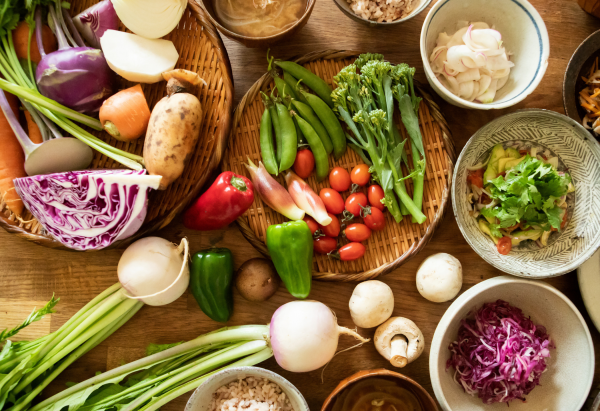
You can't control how old you get, but you can positively influence it by making the right food choices.
Green tea is one of the healthiest drinks out there, thanks to its antibacterial and detoxifying properties. The antioxidants in the tea clean up the harmful molecules in your body. In addition, green tea improves your immune system, your metabolism and cholesterol levels.
How much?
With 2 to 3 cups of green tea daily, you can take full advantage of all the healthy benefits. Note:let the boiled water cool for 10 minutes (it will then be about 80 degrees and you prevent the good substances from being lost). Then let the green tea steep for 3 to 4 minutes before drinking it.
Alternative?
Pimp your green tea with a slice of orange, ginger or lemon.
These are omega-3 fatty acids. These are mainly found in fatty fish (mackerel, herring, salmon, trout). They lower the risk of cardiovascular disease and high blood pressure.
How much?
Eating one portion of fish a week lowers the risk of dying from heart disease. Would you rather take a vegetable
supplement? Then go for 1 gram of EPA and DHA per day.
Alternative?
Linseed (oil), chia seed (broken), hemp seed, walnuts
The reason that avocado is so healthy is partly because the fruit consists of about 15 percent of monounsaturated fatty acids. Your body runs on good fats, including your metabolism, gut, cholesterol, immune system and brain functions.
How much?
Eat half an avocado every now and then.
Alternative?
None
Read also:7 special ways to eat avocado
Pomegranate seeds are strong antioxidants (polyphenols, vitamin C) and therefore have an anti-inflammatory effect
operation. They are good for your blood pressure and reduce the risk of cardiovascular disease.
How much?
The daily amount (RDA) of vitamin C is 70 milligrams. 1 pomegranate contains 30 percent of your daily dose of vitamin C.
Alternative?
Fruits and vegetables, especially Brussels sprouts, kale, red pepper, kiwi, orange, blackcurrant.
Carrots contain provitamin A (carotenoid). Important for the proper functioning of your immune system and your eyes. The vitamin is also involved in the production of skin and hair cells and lung tissue. So a real multi-tasker.
How much?
For these health effects, an adult woman needs 680 micrograms per day (men 800 micrograms). This is equivalent to 100 grams of carrots.
Alternative?
Kale, spinach or endive
Meat is rich in vitamin B12, essential for the production of red blood cells, which carry oxygen in your blood. Also
not unimportant:the vitamin helps in the proper functioning of the nervous system.
How much?
The recommended daily amount of vitamin B12 is 2.8 micrograms. This is equivalent to 130 grams of beef. That is a bit much, so supplement your B12 with alternatives.
Alternative?
Salmon, yogurt, milk, egg. Especially vegans pay attention:take vitamin B12 supplements.
Cocoa beans are powerhouses thanks to its antioxidants and flavonoids. They have a positive effect on the heart and blood vessels.
How much?
Add a teaspoon of raw cocoa to your smoothie, yogurt or pancake mix every week.
Alternative?
Pecans, onions, apples, pears.
Garlic mainly owes its medicinal effect to the sulfur-containing substance allicin. That helps against infections, ulcers and high blood pressure. It strengthens the immune system and reduces the deposition of plaque on arterial walls.
How much?
For these health benefits, you should actually eat four garlic cloves a day. Quite spicy, so just regularly add a clove of garlic to the food. Preferably pressed raw and in combination with olive oil, to promote absorption of the active ingredients.
Alternative?
Onion, chives.
Parsley derives its power from the complicated name pyrroloquinoline quinone (PQQ), a promising anti-aging compound that aids in the formation and branching of nerve cells.
How much?
Add fresh parsley to your food regularly. With a varied diet you get 1 to 2 milligrams of PQQ daily, which is good.
Alternative?
Spinach, kiwi, papaya, tofu, green pepper.
The fibers in wholemeal bread are extremely healthy, because they boost your digestion, bowel movements and intestinal flora. They thus reduce the risk of cardiovascular disease, type 2 diabetes and colon cancer.
How much?
Getting your daily recommended serving of 30 to 40 grams of dietary fiber is a challenge. One whole-wheat sandwich contains 2.3 grams of fiber.
Alternative?
Oatmeal, brown rice, vegetables, nuts, legumes.
Now from €1.99
To the digital kiosk